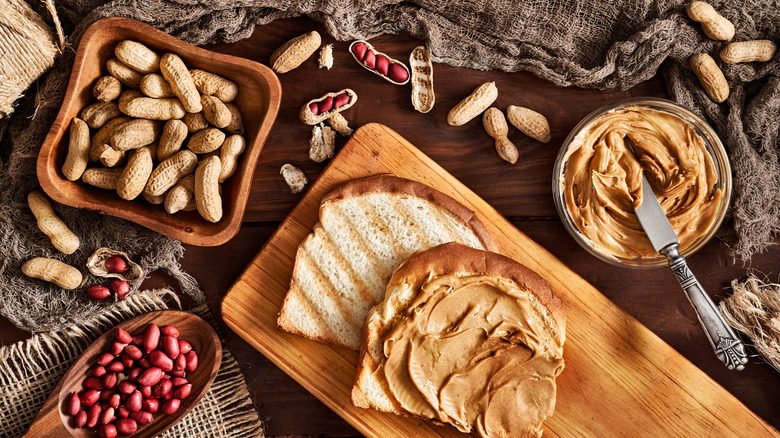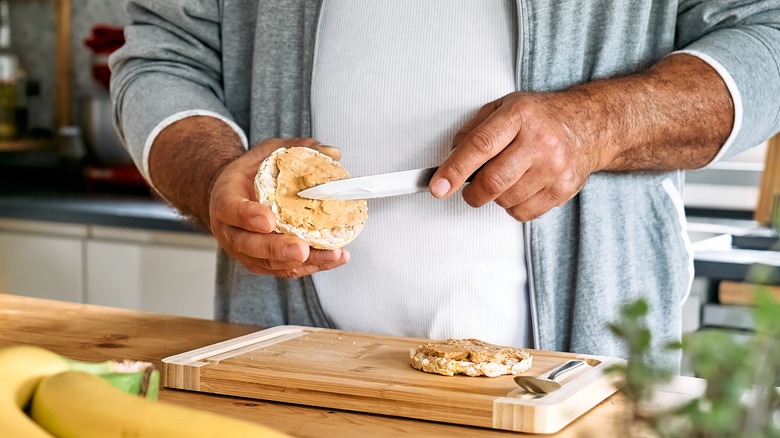Eating This Popular Sandwich Spread May Reduce Your Risk Of Cancer
Peanuts are a fan favorite at carnivals and baseball games. Aside from being a tasty snack, these nuts can provide us with numerous vitamins and minerals depending on how they're prepared. According to the U.S. Department of Agriculture (USDA), in 1 cup of raw peanuts, you'll find nearly 38 grams of protein, over 12 grams of fiber, 1,030 milligrams of potassium, 549 milligrams of phosphorus, and much more.
Nuts, including peanuts, have been linked with a reduced risk of cancer due to their purported anti-inflammatory, antioxidant, and immune-boosting properties, according to a 2021 systematic review and meta-analysis published in Advances in Nutrition. However, can the same be said for peanut butter? After all, nearly half of all peanut consumption in the U.S. is derived from peanut butter (via The American Journal of Clinical Nutrition).
As kids, a lunchtime PB&J sandwich was considered a delicacy. There was simply nothing better than biting down into a glob of creamy peanut butter. If to this day you continue to adorn your sandwiches with this nutty spread, yes, you may be minimizing your risk of cancer; but likely to a lesser degree than peanuts might.
Peanut butter may lower our risk for certain types of cancer
In the 2017 study published in The American Journal of Clinical Nutrition, researchers set out to see if eating nuts and peanut butter influenced a person's risk for esophageal and gastric cancers. Using data from the NIH-AARP Diet and Health Study, which began between 1995 and 1996 and involved more than 566,000 middle-aged and older adults, the researchers tracked subject cancer rates over a 15.5-year follow-up period. A total of 2,719 esophageal and gastric cancer cases were detected. Additional questionnaire data revealed how often participants ate certain types of foods. The findings revealed that those who ate greater amounts of peanut butter were significantly less prone to gastric noncardia adenocarcinoma in comparison to non-peanut butter eaters. This risk was nearly cut in half per each tablespoon of peanut butter ingested. However, this relationship was not observed for every type of cancer examined in the study.
These findings support the outcomes of alternate studies that have also shown varied results. Researchers from the previously mentioned 2021 scientific review published in Advances in Nutrition outline how one study found a connection between eating peanut butter and reduced cancer risk. Meanwhile, results of a 2019 longitudinal study published in Lung Cancer showed no link between peanut butter consumption and lung cancer risk. However, risk reduction of one lung cancer subtype — small cell carcinoma — was seen amongst men who ate peanuts.
Study findings show conflicting evidence regarding the anti-carcinogenic effects of peanut butter
Men may also lower their susceptibility to pancreatic cancer by adding peanut butter to their favorite sandwiches. Results from a 2018 longitudinal study published in Cancer Epidemiology Biomarkers Prevention found that, for men, eating peanut butter was associated with a substantially lower risk of microscopically confirmed pancreatic cancer (MCPC). Yet these same results could not be confirmed in women.
On the opposite end of the spectrum, findings from a 2020 study published in Carcinogenesis found that peanut butter consumption actually increased the likelihood of the development of certain types of colorectal cancer in men.
Overall, there is more evidence to suggest a relationship between peanut consumption and a reduced risk of cancer and cancer-related death than there is for peanut butter. Why might this discrepancy exist? Researchers from the previously mentioned 2021 study published in Advances in Nutrition suggest that, unlike peanuts, peanut butter contains added ingredients like trans fats which may minimize the potential cancer-fighting effects of peanuts.



